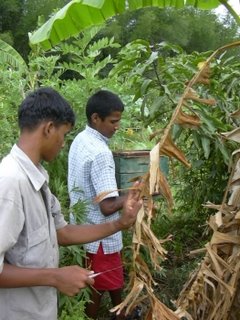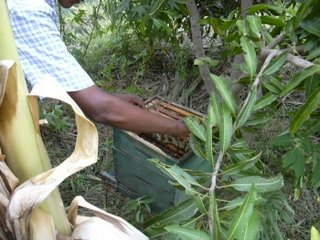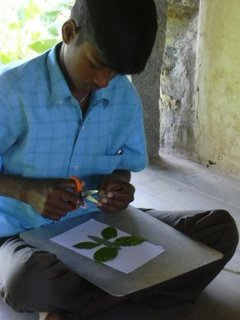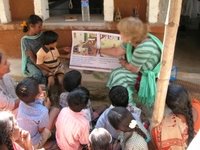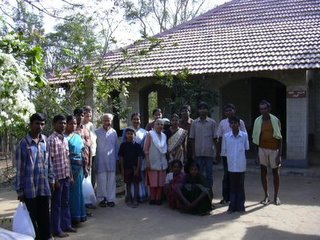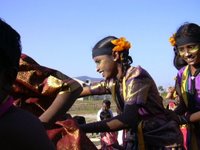Greetings from Sittilingi. Its been a while since the last post and hope this update will help fill the gap in communication. We have had the usual problems with crashing computers, and dead phone lines [the Thulir phone is dead as write this, and we are hoping to somehow access the net from elsewhere to post this!]. The connection is very poor in Sittilingi so this update might just be largely text without photographs.
Update on Basic Technology Course:
The course has so far been a roller coaster ride with moments of exhilaration and of depression and despair. Its been constantly on our minds to put down detailed notes and share it with you all through the Blog. But one of the major outcome of starting the course has been a lack of time and energy to sit down and write.
We started the course with the idea that one of us can take charge of the course full time and leave the other person to look after the continuing programmes at Thulir [the other morning and evening classes]. We had to quickly give this up as it became too exhausting for a single person to be with the students for the full day and take all the classes [not to mention the quick boredom amongst the students in having to sit with a single teacher for the whole day!]. Now the two of us are involved together splitting the classes between us.
The interesting challenge so far has been trying to balance classroom theory sessions with practical classes. there have been times when we have had more of theory, and the students had lost patience and interest and showed restlessness. At times such as these we try to quickly move on to practical sessions, though this is often not easy. The reason being that practical work needs careful planning and ensuring that the right type of tools in adequate quantities along with the raw materials are available. This is proving to be difficult as we have yet to establish our workshops and equip them properly and out of campus work such as electrical wiring/ plumbing needs real life work available when we need it.
Well, coming down to the specifics of what the course has been going through so far, you may remember that we had talked about the beekeeping workshop in our last post. Here's continuing from there...
The Beekeeping training at Vazhathottam was very useful. The boys learnt many useful tips on how to capture bee colonies from the wild and also various aspects of maintenance of the bee boxes.
As mentioned earlier in our previous Blog post, the workshop conducted at Thulir on beekeeping by Justin Raj and Rajendran of Keystone, generated such a lot of enthusiasm that we decided to take it further. So Senthil, Jayaram, Perumal, Balu and Selvaraj along with Anu and Sreyarth went to Keystone's Field Station at Vazhaithottam, Nilgiris.
Excerpts from Anu's notes on this trip:
"It was a truly great experience. Vazhathottam is located in the Sigur plateau next to the Mudumalai wildlife sanctuary and staying in such a place was a bonus. We went for walks into the forest nearby and spotted Malabar squirrels, wild dogs, deer etc.
Justin Raj was an excellent teacher and the boys had more than enough opportunities to work on many bee boxes each at a different stages of development and honey production, presenting one with its own unique problem. We were particularly happy that Sreyarth [our 9 yr old son] was completely involved in the training, took notes diligently, kept a record of the days happenings every night, and handled bees with ease and with interest. He asked us for a Bee box as a birthday gift. Seeing his enthusiasm, Drs. Nandakumar and Shyla at Gudalur, gave him one of their empty bee boxes. We were also very impressed by the dignity and confidence of the tribal boys while handling the bees. They are absolutely quiet and full of concentration . They do not flinch or move even an eyelid when they get stung. And to think that none of the boys had had any previous experience with the bees!"
Once they came back, there was much enthusiasm and almost every day they would be off early morning or later in the afternoons to hunt for colonies to capture. Of course , some of the boys got stung . The bees seem to especially like the area around the eyes. Soon we had most of them moving around with swollen eyes and temporarily half blind. Balu, while walking early morning to his family farm spied a bee colony in transit[with his one working eye of course!]. Bees in transit are ideal for capture, as they have voluntarily left their hive to setup a new hive. Balu was not prepared as he didn't have an empty box or a netted bag which is normally used and had no one to help. Not one to be easily discouraged, Balu found a one foot long piece of bamboo lying by the road side, picked up a piece of waste plastic carry bag, to use as a stopper for the bamboo, neatly gathered the bees and put them into the hollow of the bamboo. Having thus captured the colony, he promptly was at our doorstep at 7 am on a Sunday morning! Very soon we had 7 boxes with new bee colonies. Every body was on a high and every morning we had bees and boys buzzing all around us . The boys kept inspecting the boxes, making sure that no ants were getting to the boxes and that bees were staying put. This went on for a couple of weeks. Then slowly disaster struck. One by one the bee boxes got attacked by worms that feed on the wax and so the bees started dying and the colonies started disappearing. Soon one morning all the boxes were empty leaving us depressed.
It took us a couple of weeks before we could pull ourselves and start afresh. We did a postmortem and realized some of the mistakes we did. In our over enthusiasm, we disturbed the boxes too much and this could have driven some of the colonies away. We have started the process again. At the time of writing there are two colonies, while a third disappeared just yesterday.
Construction work at Thulir Extn:
The Construction of the new wing at Thulir [which we had briefly mentioned in our post of July 28th ] is over. The mud and thatch workshed and storeroom has been finished and we have started using them. The lack of space, the constant construction activities and the heaps of mud and stone and dust amidst all our varied activities and increased number of people were getting on all our nerves . We heaved a sigh of relief when we had the extra space. We inaugurated it with all the younger kids making patterns with flowers all over the floor [Poo-kolams ] on Onam day. A big thanks to V.Krishnan and Santhanam Sridhar for financing the workshed.
So the Basic Technology course students have a classroom/ workspace as well as a new equipment/ tools store. The construction gave an opportunity to learn basic some building skills. The students got to help in doing the thatch roof as well as in making walls of Rammed earth. The theory classes conducted alongside introduced them to measurements, basic drawing of plans, concepts of scaled drawings etc.
The next step was to do a small construction project by themselves [without masons!]. We had plans to do a small extension to our house nearby and so this was a good opportunity for them to take on a building project. As a first step the students learnt to make stabilized mud blocks using a simple hand operated machine. The next step was to learn to mark out a building on site, and learn to do foundation work. The work started with ambitious 6 hour long work sessions, and soon every one was too tired [including us as we haven't been doing construction work at site for a while now!] and exhausted to pay any attention in the theory classes that dwelt on estimation and working out costs for billing their work.
So we settled down to a routine where they work 2 to 3 hours every day. Once they started to do the wall masonry the excitement mounted and the fascination in learning to build a wall to plumb took over. As I write this [sept 21st], we have just finished building a masonry arch today and are all feeling very good! There’s something almost magical when the form work that supports the arch is removed and the arch stands by itself defying gravity. [We just had a ceremonious removing of the form work that was greeted with a round of applause by the evening students who came to Thulir!].
With this achievement the students are feeling so good today, that they want to also try their hands at doing the bamboo and thatch roofing by themselves without a carpenter.
Maintenance of electrical and plumbing work:
Our students have become so confident now of their wiring and plumbing skills that they take up any maintenance work in our campus with keen interest and are able to complete it without constant supervision. They were able to locate a shorted underground cable, and fix it! This we thought would be a tricky job and had planned to arrange for an electrician to come after the boys give it a shot.
Billing of work:
One of the most important work that the students have to do routinely is recording details of materials used, their costs and also amount of time spent/ and quantity of work done. We feel that this is the most important aspect they need to learn to be able to become entrepreneurs. Also we need to quantify all the work that is done by the students and properly cost it so that the course too is clear about costs involved in training as well as income generated through learning by doing. Already, having heard of the kind of work the students are learning, the villagers have started getting small jobs done by us. Recently, we were asked to come and do a costing for a construction work done in the village to settle a dispute regarding contract payment. Our students went to measure the building and we helped them to work out the quantities. There have been requests to fix electronic gadgets such as radios and TVs, but currently we don't have the expertise and so are unable to take on these jobs.
Drop in number of Girl children visiting Thulir:
In April this year we had a tragedy. Nearby Thulir there is a stream with beautiful rock formations with a large pool t its bottom. This is a favourite place for children to go swimming and diving during hot summer afternoons. One afternoon when the Thulir boys were at The stream, a neighbour who had just finished his school final exams, and had come back home from his hostel, took a hurried dive into the shallow end of the pool and smashed his skull on a rock under water. Our boys had to pull out the body from underwater and we were all helpless as death had been instantaneous. This was a traumatic event and it took several weeks for the boys to shake themselves off it and resume normal visits to Thulir. This particular spot and the land adjacent to it was always believed to be haunted and this event reinforced this. The tragedy too was attributed to the spirit. But as children have to pass this land to come to Thulir,for a while, attendance at Thulir dropped drastically but picked up again. But the girl children have not come back in the numbers they used to before this tragedy. Coupled with this some of the senior girls came of age and the event has provided a convenient excuse for the parents not to send them. We have talked to some of the parents, and offered to escort their children back to the village in the evening [a distance of 600 meters], and so a few of them have started coming back. Visiting these homes in the Village was a very encouraging experience. We were welcomed very warmly and parents were generally appreciative of Thulir’s work. After being in Sittilingi for 3 years, now we are better accepted and are greeted warmly when we pass the village. We feel a lot more comfortable now and feel that we have some measure of acceptability among the villagers which we expected to happen [if at all] after a much longer time. THI’s work and the goodwill they have earned among the community , is an important factor in this happening so fast. We also hope that this is a sign of some degree of acceptance of our ideas among the community.
This year we have also had several requests from students appearing for class 10 exams that they would like to prepare for their exams by coming to Thulir full time. Right now we have three such students and two of our Basic Technology course students are also appearing for class 10 exams in some subjects [Mohan is writing English and maths and Senthil is appearing for the English exam.].This also takes a considerable time and effort from our side. Sometimes it is really frustrating as the students have not been taught any of the basics .
A new trainee has joined us:
Gowri from Sittilingi, aged 21 has joined Thulir as a trainee. She has studied B.A.
Tamil/Math month at Thulir:
This year we thought we would organize the evening sessions a bit more and so decided to focus on a single subject every month. So the activities [whether they are games or puzzles or reading writing exercises are all pertaining to the subject of the month. We have had focus on Tamil and are currently onto Math.
Visitors to Thulir:
Varuni: A graduate student from New York, Varuni taught the children craft work with wastepaper.
Tarsh Thekaekara came from Bangalore and fixed problems with the Thulir Computers. Thulir computers decided to crash one after the other and suddenly we were left with none of them working. Thanks to Tarsh we now have one working PC and so are able to send and receive mail [when the phone lines work!], and are able to do some of the routine writing and accounts work. He took a class on electronics for the students, teaching them basic soldering skills.
Harsha and Tariq visited us from Bangalore. Besides doing sessions in Art with Thulir Children, they also gave a boost to the volley ball game played in the evenings.
All the above mentioned persons are children of friends and colleagues of ours and we have seen them grow up as children. Now they are all confident young adults involved in learning different vocations. Having them visit us was such a pleasure. They deeply empathise with Thulir children and were ready to interact with them and conduct sessions for them. We also realised how much they have thought about issues relating to learning and education.
Shri. Balasubramanian and Shrimathi Meenakshi from Chennai spent a few days with us .Shrimathi. Meenakshi conducted interesting sessions for the younger children . Her Tamil classes for our son Sreyarth were especially helpful as on most days we tend to neglect his needs while we cater to the various demands being made on us. She also helped the hospital with a lot of Tamil – English translations.
Maggie and Caroline, medical interns visiting THI hospital are with us for 2 months and have been interacting with the Thulir children every week. They joined us on a hike with the children to the nearby forest. Their sessions give an opportunity for our children to learn English.
Mr Suresh Nair and Mr S.Bhashyam from Bangalore visited us last month. They were appreciative of our work and made a generous financial contribution.
We would like to thank all the above mentioned people and look forward to their visits to Sittilingi and support in the future. We also take this opportunity to thank all of you who have been good friends of Thulir, and shown your appreciation through words of encouragement, visiting us and conducting sessions with Thulir students and through financial contributions. We have been very fortunate in having a large group of very supportive individuals without whom our efforts at Thulir would be impossible. We look forward to continuing this relationship and hope to see more of you visit us.

